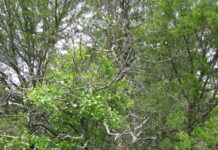Photo credit: DiasporaEngager (www.DiasporaEngager.com).
The dog control programme started in 2023 after the country’s stray dog situation was alarming. (Seychelles Nation)
Photo license
(Seychelles News Agency) – In a continuous effort to deal with the large number of stray dogs in the country, Seychelles has sought the assistance of a well-known Swedish zoo and wildlife veterinarian and academic, Dr Therese Hård, and her team.
Hård’s expertise and experience will be used to conduct a comprehensive analysis on the stray dog population in Seychelles and recommendations and training will be held afterwards. This will help equip the local authorities with the necessary tools to carry out the stray dogs’ programme in a humane manner.
The team arrived in Seychelles on Tuesday and will be spending a week making site visits and discussions with local authorities.
Hård met with the Minister for Agriculture, Climate Change and Environment, Flavien Joubert, on Tuesday.
She told reporters, “The purpose of our visit is to discuss how to work together and provide training to deal with the feral dog situation in Seychelles.”
Hård added, “We want to be able to work with the latest techniques in long-distance capture, to work on anaesthesia protocols, to meet the needs of animal welfare.”
| Dr Therese Hård (middle) and a member of her team met with Minister Joubert. (Seychelles Nation) Photo License: CC-BY. |
While she will be working primarily with the Ministry of Agriculture, Climate Change and Environment, Hård and her team will also be working closely with non-governmental organisations to build a long-term relationship.
The head of the Animal Welfare Unit, Girra Pierre, explained that bringing Dr Hård and her team to Seychelles will help them to be able to implement the stray dog control programme more humanely.
The dog control programme started in 2023 after the country’s stray dog situation was alarming. Through the Dog Control Programme, the department seeks to prevent unwanted litters, which will directly reduce the stray dog population and save up on the resources of the department and its partners. Dog shelters in the country were operating at capacity and were understaffed.
This comes after an uproar last year when the killing of stray dogs sparked outrage among animal rights activists, who felt that the killing of these dogs was not the right way to deal with the situation.
According to Pierre, the killing of these dogs will now not happen, but they will instead focus on neutering the dogs, to stop them from breeding and increasing their population.
“With this programme, people might not see the population of stray dogs decrease drastically, but over the long term, we will see that it will decrease, as they will not be able to re-populate,” adds Pierre, assuring that killing the dogs is now not an option.
She also spoke of their work with the two animal shelters in Seychelles, where through their close collaboration, they can also capture the dogs and use the shelters as a means to give the dogs a home through adoption.
After the initial week in the country, Hård will return in the future for further work and training as the programme continues.
Source of original article: Seychelles News Agency (www.seychellesnewsagency.com).
The content of this article does not necessarily reflect the views or opinion of Global Diaspora News (www.GlobalDiasporaNews.com).
To submit your press release: (https://www.GlobalDiasporaNews.com/pr).
To advertise on Global Diaspora News: (www.GlobalDiasporaNews.com/ads).
Sign up to Global Diaspora News newsletter (https://www.GlobalDiasporaNews.com/newsletter/) to start receiving updates and opportunities directly in your email inbox for free.

































